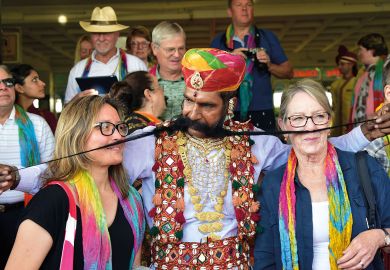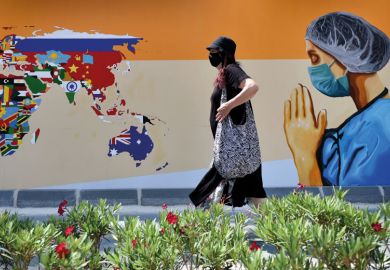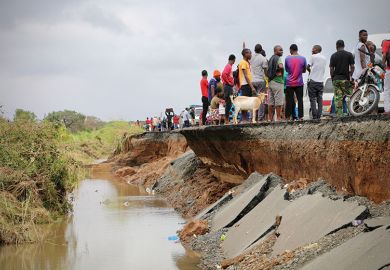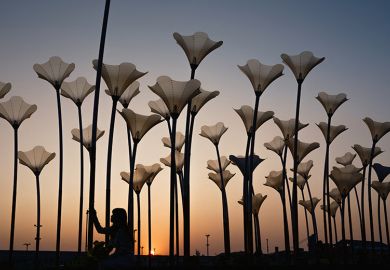Humanity’s greatest economic, social and technological leaps have their roots in times of deep crisis, such as the Covid-19 pandemic. Crises provide impetus for change, and for the reconstruction of the economy and society. In moments such as these, it is possible to reconfigure institutional arrangements that have endured for long periods of time.
Might it therefore be possible to reconfigure some enduring but problematic aspects of the global university system? We focus here on two aspects of universities’ roles in shaping our future – teaching and international collaborative partnerships. Using the Covid-19 crisis, we reflect on ways in which the global architecture of the university system could be reconfigured. We are of the view that the “local university” is more relevant than ever before, but that in order for it to thrive and contribute to a better local and global order, the architecture of university partnerships itself needs to be reconfigured.
That Covid-19 will have a transformative impact on the way learning happens within universities seems indisputable. The most dramatic evidence of this is the shift to online learning. This has been under way for some years now but was dramatically accelerated under Covid-19.
Almost all our leading universities internationally have rapidly shifted to emergency remote online learning. The teaching programmes were not pedagogically constructed for online learning, but were quickly restructured and reorganised. We should expect this development to proceed at pace as new technologies for teaching become embedded.
Does this, however, mark the end of the bricks and mortar university? Moreover, does it mark the end of leading universities in the Global South – such as the University of the Witwatersrand (Wits) or Makerere University? After all, if the elites of South Africa and Uganda can study online at Harvard or Oxford, why would they choose Wits or Makerere?
We don’t believe so, for two reasons. First, learning in universities involves a lot more than simple instruction. Students learn as much outside the classroom as they do within. Universities enable the development of soft skills, consolidation of an intelligentsia, and the promotion of a cohesive citizenry. Of course, none of this is going to happen simply as it did before. Instead we are likely to move to some form of blended learning, where part of learning will happen online, and other parts in face-to-face interaction. The university of the future will enable a seamless navigation between these two modalities of learning.
Second, as highlighted by Covid-19, local context and knowledge matters even during a global pandemic. In many societies, dealing with the pandemic has involved drawing on the expertise of local scientists who are steeped in understanding the local context. In the case of South Africa, for example, dealing with Covid-19 involves having to harness expertise in our local HIV/Aids research community and economists who understand our economic challenges.
Covid-19 also highlights the need to reimagine the global institutional architecture of the higher education system and the partnerships that accompany it. This is an area that we have been working on at Wits for a number of years. We have invested heavily in building the African Research Universities Alliance and more equitable relationships with UCL and the University of Edinburgh, among others.
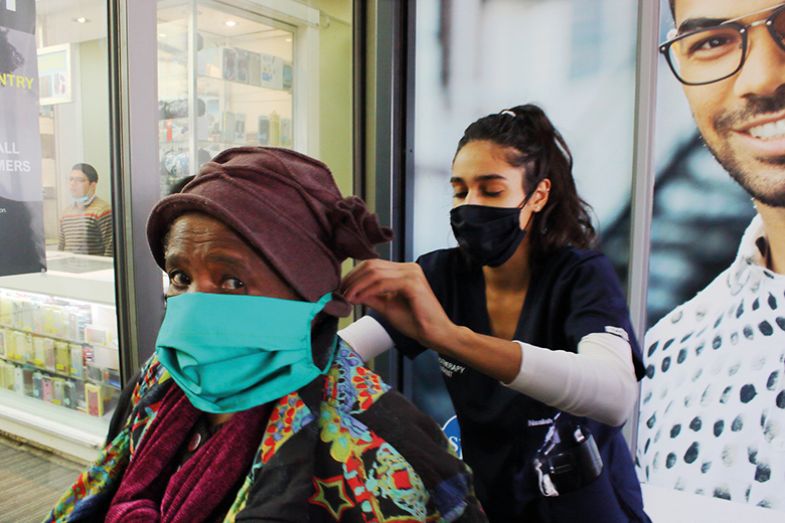
If this pandemic demonstrates anything, it should be that while our challenges are global, local context and knowledge matter more than ever. Notice, for example, how the different parts of the globe battle with strategies for mitigating Covid-19, and how strategies such as a lockdown have had different impacts across the globe. Thus, we require high-quality institutions and human resource capacities across the world to address both global challenges and their local manifestations. Moreover, unless institutions in the Global South are simultaneously able to innovate in their local context and also able to generate ideas and solutions to global problems from their spatial and social perspectives, we will not have reached effective and lasting solutions to our transnational challenges. As long as capable institutions and capacities do not exist across the world and in different contexts to contain global challenges such as infectious diseases, so long will the world remain vulnerable to the next crisis.
This is why our global partnerships and the institutional architecture of higher education have to change to the “new normal”. Our global partnership model has not fundamentally changed since the 1980s. Its methodology is to direct scholarships to talented individuals in the developing world, and have them come to Europe and North America to acquire tertiary education. The assumption is of course that these students will return home. But the evidence of the past few decades is that this is not the case. The corollary of this in the developing world is that institutions have been weakened, human resource capacities are weakening or are not being developed, and inclusive development is being compromised. Of course, some among us speak of brain circulation rather than brain drain, and the importance of remittances to the developing world. But, if we are honest, we would recognise that these are weak countertrends that do not fundamentally change the negative institutional and structural dynamics that accompany the brain drain and compromise inclusive development.
We must stress that this is not only a problem for the developing world. It is as much a problem for the developed world. Herein lies the dilemma. As human resource capacities decline in the developing world, so does our ability to deal with the structural challenges of our era. All our challenges are transnational in character. Climate change, inequality, public health, social and political polarisation – all these have global and local consequences. The Covid-19 pandemic is the most dramatic illustration of this. The only way we have a fighting chance of beating Covid-19 is if the institutional infrastructure and human resources in both the developed and developing world exists and is able to stem the challenge at its source, wherever it emerges. Yet our global partnership methodologies undermine this, in practice if not in intent.
We must hasten to argue that we are not advocating for some autarchic retreat into nationalism and ethnicity. We do not believe this is possible and we are of the view that the human spirit has simultaneously an impulse to wander and explore (globalise, if you like) and identify and familiarise (localise, if you need a term to describe this). These are not mutually exclusive agendas as populist and nativist parties tend to suggest. Instead, they can be complementary elements of a human existence.
What we are then advocating is a new methodology of global partnership, one that is more rooted in building institutions than individuals. In higher education, this would require joint teaching programmes and split-site scholarships that would enable students to gain scientific knowledge, develop a global consciousness, have access to new equipment and funding networks, and yet be sufficiently rooted in institutions of the developing world to allow for knowledge and skills to be deployed within their local contexts. Such a methodology would also allow students from the developed world to have the opportunity to visit the developing world and have institutional settings that can host them, so that they too can understand the contextual circumstances they are visiting, and develop skills and knowledge that are more universally applicable.
Higher education has to reimagine its teaching, partnerships, institutional architecture, and objectives so as to enable the building of quality institutions and human capacity across the globe. Only with such an equitable agenda of change, both in and across nations, will we be able to address the global challenges of our time and through this build a more cohesive human community without which we will not survive as a human species.
Adam Habib is vice-chancellor and principal of the University of the Witwatersrand and will become director of SOAS University of London in January 2021. Imraan Valodia is dean of the University of the Witwatersrand’s faculty of commerce, law and management.
The Times Higher Education World University Rankings 2021 will be published at 12pm BST on 2 September. The results will be exclusively revealed at the THE World Academic Summit, which will explore the challenges created or accelerated by the pandemic and identify new opportunities for progressive reform.
POSTSCRIPT:
Print headline: We need a new model for global partnerships
Register to continue
Why register?
- Registration is free and only takes a moment
- Once registered, you can read 3 articles a month
- Sign up for our newsletter
Subscribe
Or subscribe for unlimited access to:
- Unlimited access to news, views, insights & reviews
- Digital editions
- Digital access to THE’s university and college rankings analysis
Already registered or a current subscriber?


